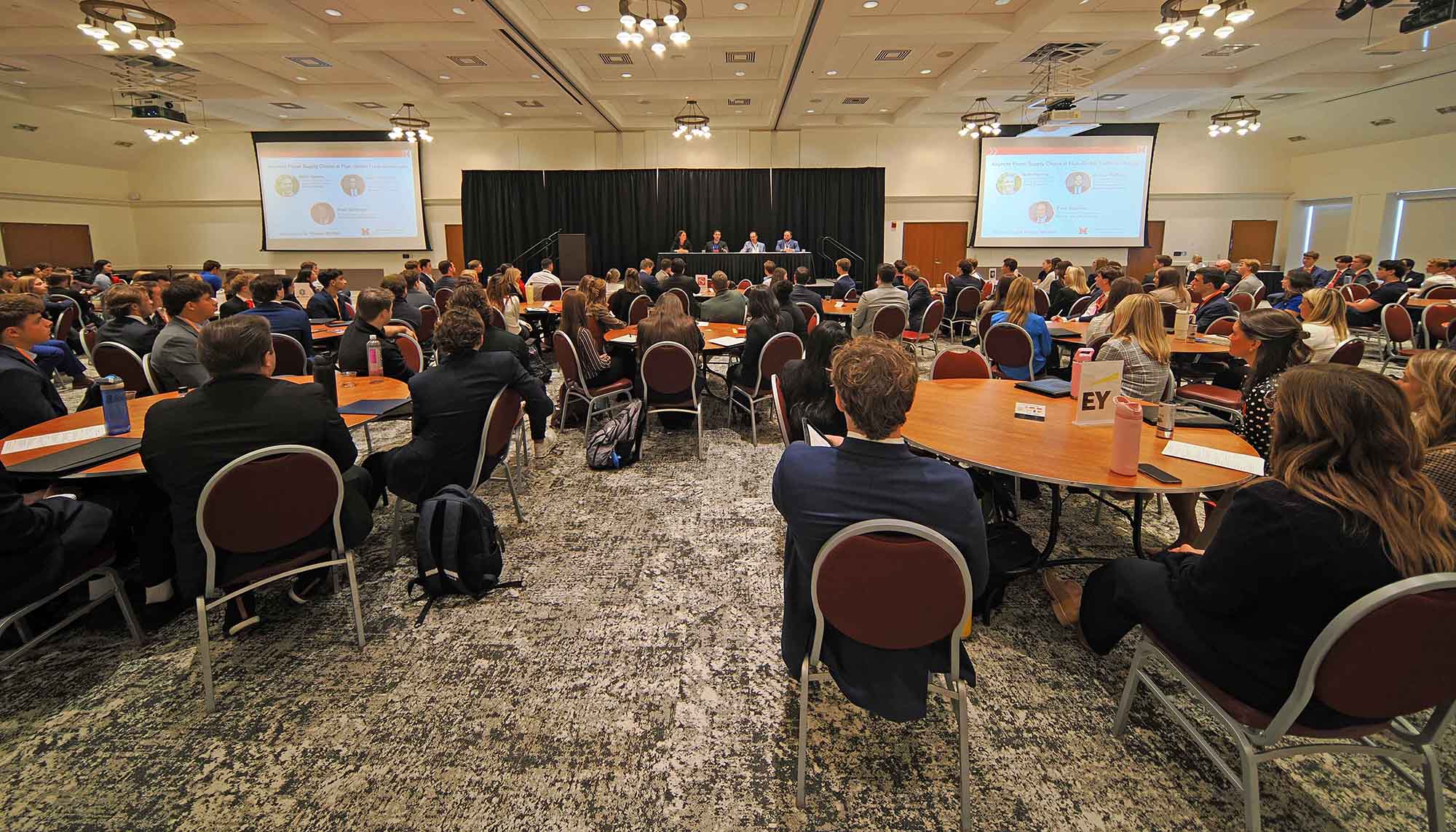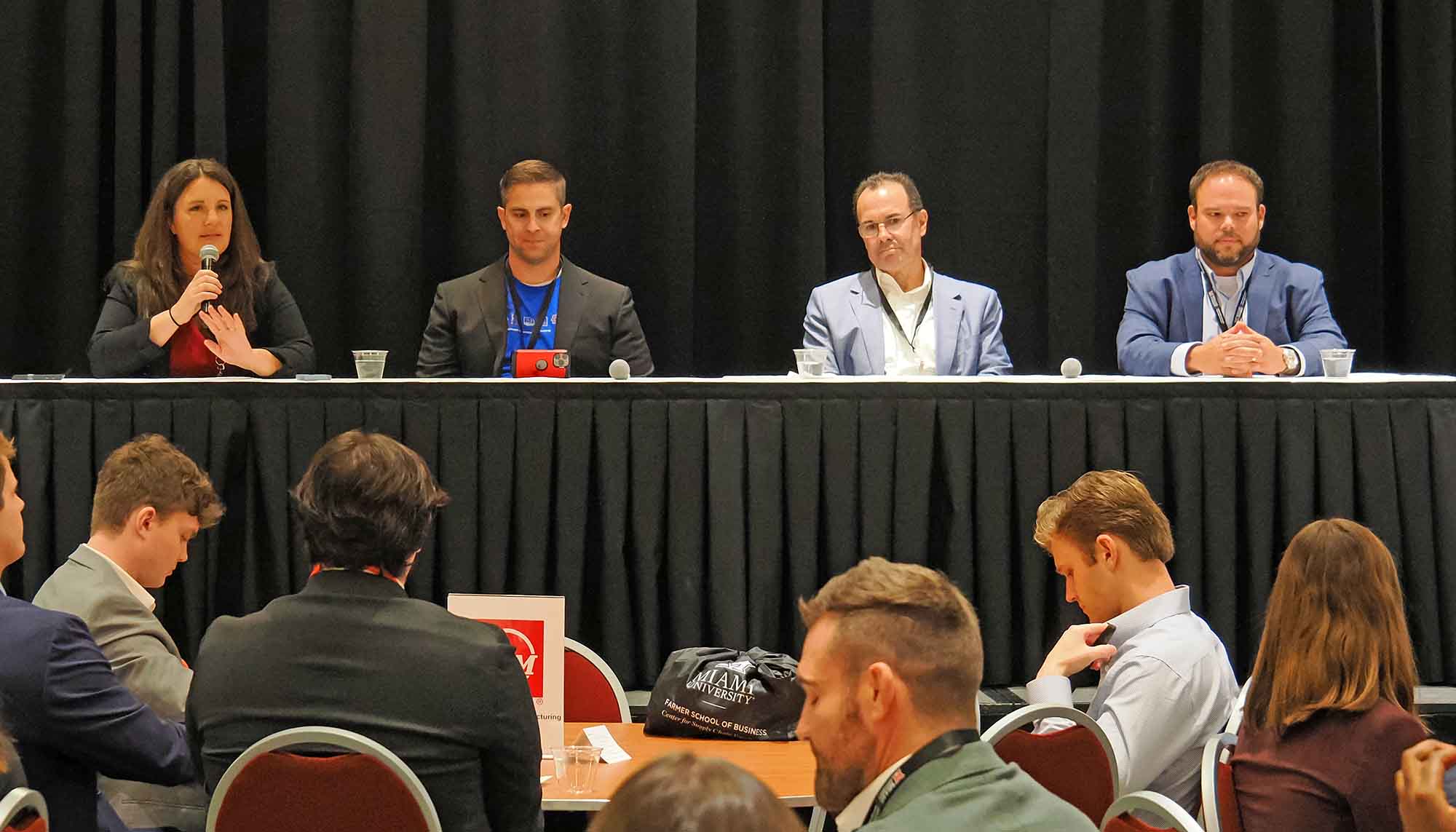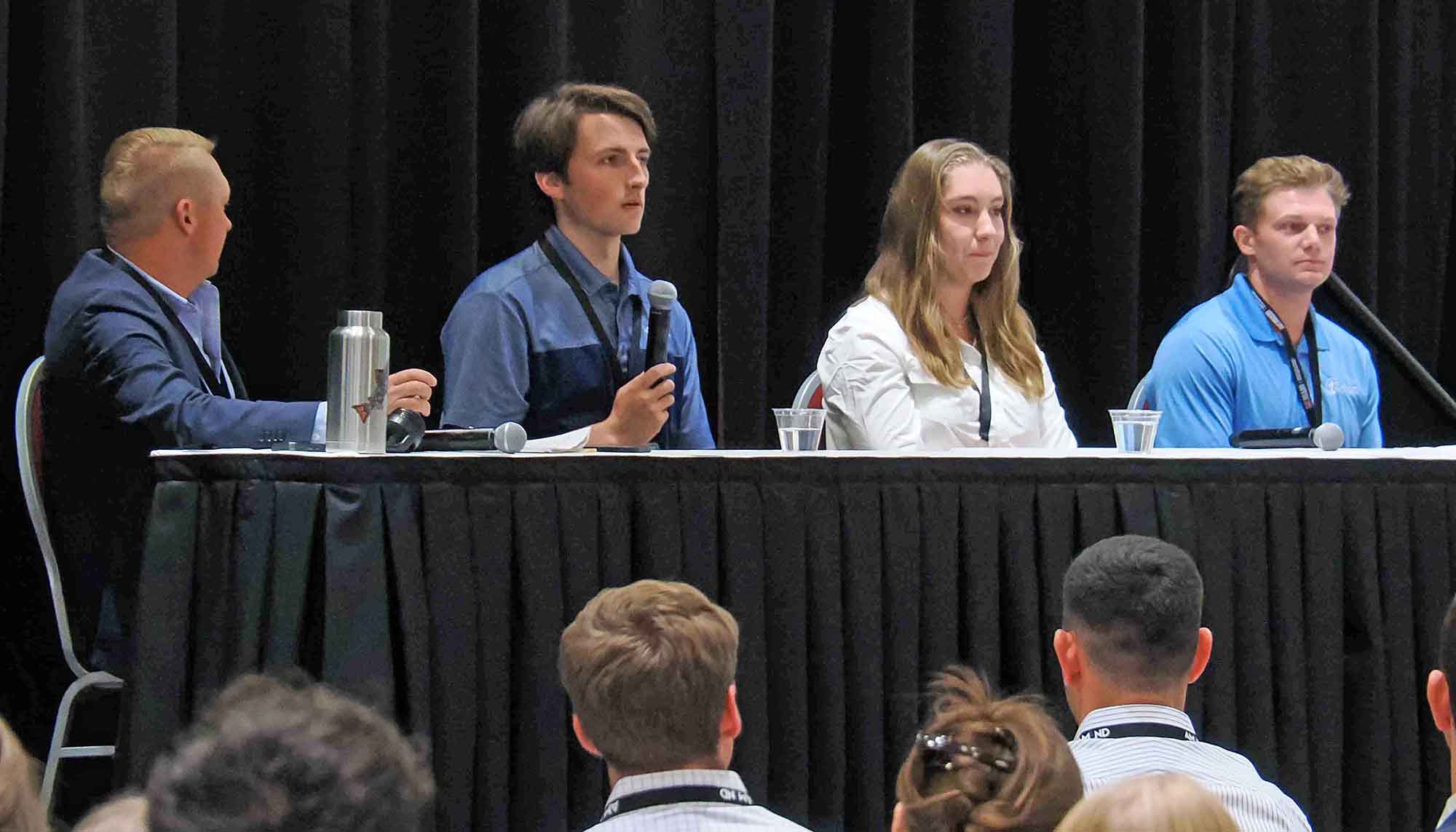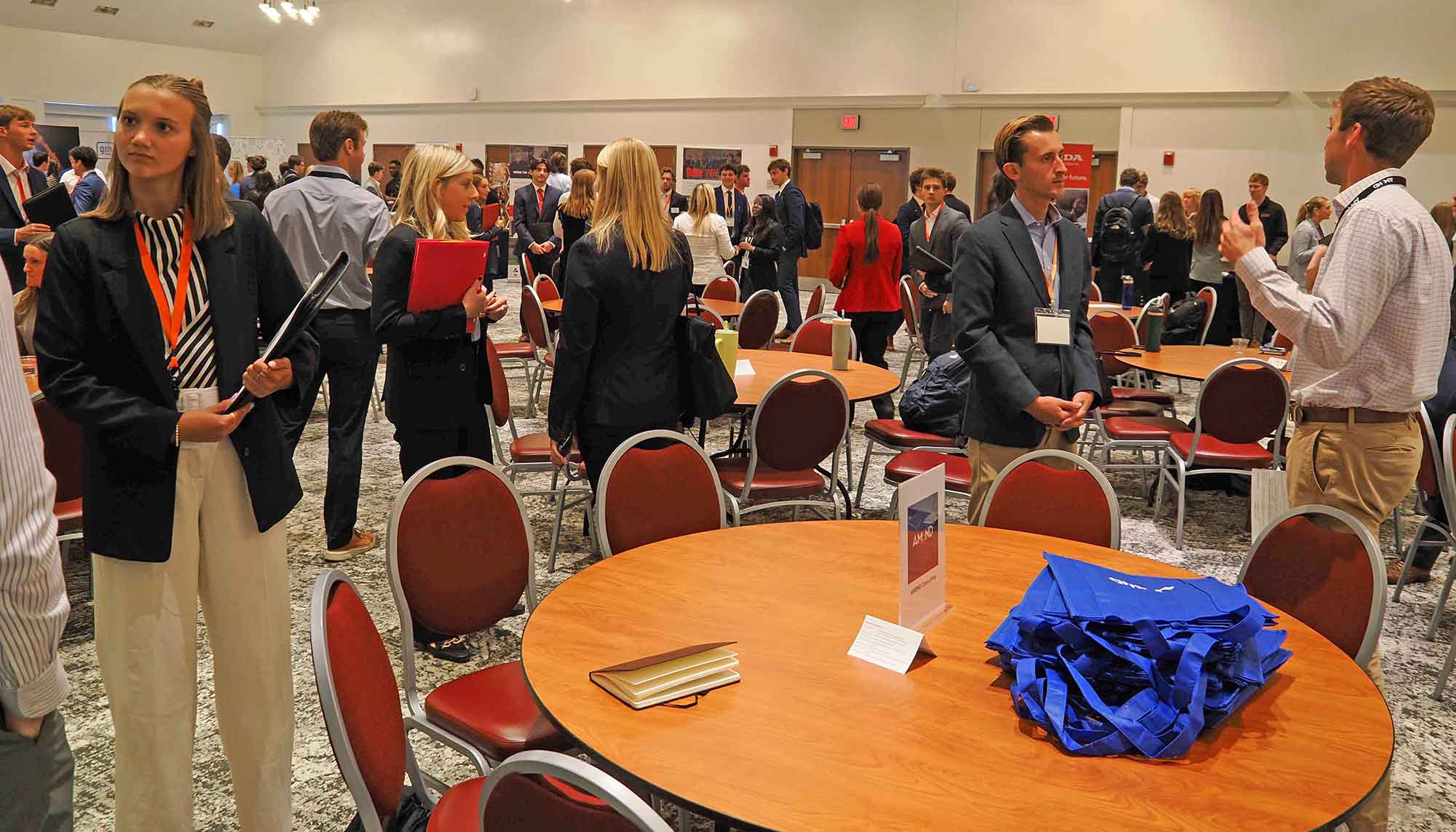Supply Chain Roundtable looks at changing landscape, gives students peek at future
Executives, alumni talk at annual conference centered on supply chain issues

Supply Chain Roundtable looks at changing landscape, gives students peek at future
It’s said that the only constant in life is change, and when it comes to supply chain management and operations, the modern landscape is an excellent example.
“The last five years in the world of supply chain, it's really changed in a big way. Five years ago, I don't think supply chain was a word that was known around kitchen tables and all over the United States. Now, it is,” Fred Solomon, VP Procurement & Supplier Quality at American Axle & Manufacturing, said at the Center for Supply Chain Excellence Supply Chain Roundtable.
The Center for Supply Chain Excellence is a vital hub within the Farmer School of Business, working with the Supply Chain and Operations Management program to foster student engagement, corporate partnerships, and cutting-edge research. The Roundtable gives students the opportunity to network with companies and managers.

Solomon joined Seth Harms from Procter & Gamble and Josh Reffner from Honda on one of two panels at the event, discussing “Supply Chains in Flux – The Global Trade Landscape.”
“We've absolutely made a number of changes in our sourcing strategy over the last several years. I would say P&G views supply chain as a competitive advantage. Previously, particularly on when we were bringing new products to market, we did not.” Harms, Director, Supply Network Design at P&G, told students. “Having a better handle of our total delivered cost and understanding the implications and the benefits of having a short, very responsive supply chain can be an incredible competitive advantage.”
“What we have noticed are some of the complexities or nuances within the supply chain that have caused us to think a little bit deeper about how we evaluate what we call ‘maker layout,’” Reffner, Division Leader, Purchasing & SC Planning Division at Honda, said. “We do evaluate it a little bit differently based on the specification where our Center of Excellence is what is going on geopolitically. We have to look at that very carefully now.”
The trio also discussed ways in which their companies are working to build innovation into their supply chains to help deal with an unknown future.
“The innovation right now is trying to unify market, demand regulation, compliance, as well as maintain a sustainable, healthy supply chain and a near-shore opportunity. So what that means is technical resources, manpower and labor automation, and then also the elements that would go into any type of component,” Reffner said. “Trying to align all of those different things and make a strategy with your supplier partnership that you have and ensure that you can forecast that business out long enough for them to pay back their investments and be a healthy, stable supplier for you.”
“The ability to have data technology to drive and understand and map your supply chain is really going to be a huge enabler going forward. We're just starting to see some AI technology-based companies that are doing that, and we're engaging with them. It's a request of our customers, but it's the right thing to do, and they're starting to map with technology and data to let you know where your supply is coming from, which is going to be a game changer for all of us,” Solomon said.
“I like to say that the best time to innovate your supply chain is when you're already touching it. That's usually just the best, cheapest way of doing it, and when you already have everybody's hands on it,” Harms said. “I've seen this done in manufacturing, when we're integrating a new unit operation, innovating on the product at the same time as we're doing that, trying to synchronize a bit more, reduce changeovers, do any step change in our operation, to give us more agility or flexibility in our manufacturing processes, and really just help drive synchronization as best as we can.”

The other panel consisted of Mitch Kunar, Peyton Albertini, and Christina Moore, all 2024 Farmer School of Business alumni working in supply chain, who talked about their experiences in their new careers.
“There's not much you can do to really be fully prepared going into your entry-level job, because you learned great concepts at school, and once you're getting into the corporate world, it helps to connect the dots,” said Moore, Supply Chain Production Planner at Swagelok. “Coming in, it took a little bit of time for me to get comfortable and really feel confident in what I was doing. So, I want you all to know it's okay to be a little stressed out going into your first job.”
“I did an internship, but then my full-time role was at a different site, so I did see similarities, but there are plenty of differences, and getting used to their new flow of things and how they worked out and seeing if I can change and adapt to that type of thing,” said Albertini, Operations Supervisor at DHL Supply Chain. “Developing these types of skills early on, such as an ability to adapt and ability to change and really prove to your managers and your coworkers that you can do it.”
“What I didn't realize was how much these companies will invest in training you. I think that everybody thinks that they need to have it all figured out right when they get there, and that's really not the case,” said Kunar, Oracle Fusion Cloud Consultant at Terillium. “We have Terillium University, and that's really where we get our feet wet, and that's really where we can get in the system and learn without a lot of pressure.”
The alumni also discussed how they maintain a work-life balance and gave the students some advice for their own transition to the working world.
“Keep honing your skills with artificial intelligence. It's a freight train. It's not stopping. Keep up on it. It's going to touch every industry. So, if you're the person who can talk about it in an intellectual, smart way, you'll stand out within the workforce,” Kunar said.
“I think the most important thing is leveraging your network that you're building throughout your time at college. You never know who's going to be able to give you a job opportunity, who's going to get you that internship,” Moore said. “And when you're in those internships, really treat it as if this is your full-time job. That's your foot in the door with companies.”
“Stay true to yourself,” Albertini said. “If you join a company and you just don't feel that fit, give it a couple of months, but if you still don't feel that thing, maybe rethink what your path is looking like. If you want to go try something else, give it a shot. Just be true to yourself.”
